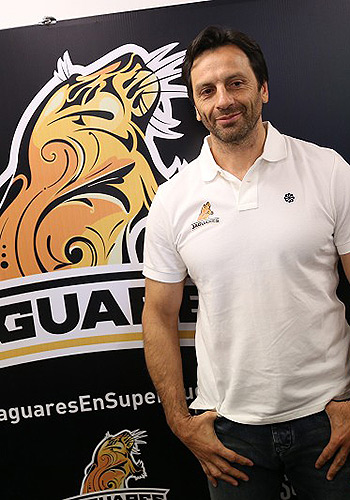Peters: Backyard rugby 'past it sell-by date'
Peters, a well-respected New Zealander who became SANZAR CEO in 2010, officially took up office in Buenos Aires this month and is excited about the new season – which will see the addition of three new teams.
Peters, speaking to rugby365 as the Jaguares stepped up their pre-season preparations ahead of their Super Rugby debut, said he sees more positives than negative in the expansion by SANZAAR (the extra A the addition of Argentina).
He said Argentina is on the cusp of a really good period.
"I saw it as an opportunity to assist and be part of what is a really bright period of Argentina rugby," Peters said, when asked why he decided to move from Sydney to Buenos Aires.
"Having been involved with Argentina through my SANZAR role [CEO], I developed a relationship with Argentina and their rugby.
"It is a great personal and professional opportunity."
Peters admitted the 2016 expansion – which will see the Jaguares (Argentina), Sunwolves (Japan) and Southern Kings (South Africa join the 15 established franchise – may experience some teething problems.
It will see an even more lopsided travel schedule for teams in the South African conference and the absurdity of playing either New Zealand or Australian teams – creating a very uneven playing field.
However, the Argentina boss is adamant that change was needed and the need to explore new territories was vital to the welfare of the game.
"In my current role [as General Manager of Unión Argentina de Rugby] we are hugely excited and very appreciative of the fact that SANZAAR has invited us to be in this competition," Peters told rugby365.
"From a personal perspective, if you keep just operating in your own back yard – and you don't try new branches, new territories or new ways of doing this – like any brand it gets tired and it is past its 'used by' date.
"SANZAAR, by considering expansion, is not without its challenges.
"However, they are taking the right course of action.
"The power of rugby in the Southern Hemisphere – with a little hump into the north and Japan – makes for a pretty powerful competition."
Peters also felt the game is going into a huge era globally, with rugby back in the Olympics for the first time since 1924.
"That will hopefully bring new fans to the game on a global basis and grow the game even further," he said, adding: "The new Super Rugby structure has its challenges, but it is an exciting opportunity to be part of.
"Test matches also still have their place in the global schedule every year.
"In our [Argentina's] case we have a very young side we can build towards the next World Cup and perhaps even further.
"We definitely have an exciting year ahead of us."
* Super Rugby expansion explained.
The 18 teams will be grouped geographically.
There are two regional groups, each consisting of two conferences: the Australasian Group, with five teams in the Australian Conference and five teams in the New Zealand Conference and the South African Group, with six South African teams, one Argentinean team and one Japanese team split into a four-team Africa One Conference a four-team Africa Two Conference.
In the group stages, there will be 17 rounds of matches, where each team will play 15 matches and have two rounds of byes for a total of 135 matches.
Teams will play six intra-conference matches; in the four-team African Conferences, each team will play the other three teams in their conference home and away, while in the five-team Australasian Conferences, each team will play two teams home and away and will play once against the other two teams (one at home and one away).
The other nine matches will be a single round of matches against each team in the other conference in their group, as well as against each team from one of the conferences in the other group.
For 2016, the teams in Africa One will play the teams in the Australian Conference, while the teams in Africa Two will play the teams in the New Zealand Conference.
The top team in each of the four conferences will automatically qualify to the quarterfinals. The next top three teams in the Australasian Group and the next top team in the South African group will also qualify to the quarterfinals as wildcards.
The conference winners will be seeded No.1 to No.4 for the quarterfinals, in order of log points gained during the group stages, while the wildcards will be seeded as No.5 to No.8 in order of log points gained during the group stages.
In the quarterfinals, the conference winners will host the first round of the play-offs, with the highest-seeded conference winner hosting the fourth-seeded wildcard entry, the second-seeded conference winner hosting the third-seeded wildcard entry, the third-seeded conference winner hosting the second-seeded wildcard entry and the fourth-seeded conference winner hosting the top-seed wildcard entry.
The quarterfinal winners will progress to the semifinals, where the highest seed to reach the semifinals will host the lowest seed and the second-seeded semifinalist will host the third-seeded team.
The winner of the semifinals will progress to the Final, at the venue of the highest-seeded team.
By Jan de Koning
@King365ed
@rugby365com
A puro tackle. #JaguaresEnSuperRugby pic.twitter.com/ERlsbcHuVg
— JaguaresARG (@JaguaresARG) January 14, 2016

















































